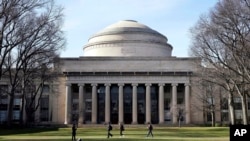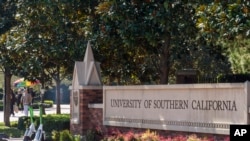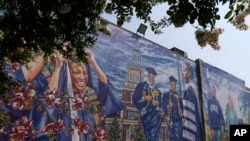Student Union
Proposed Legislation Would Give Afghan Scholars Special Visa to US

A congressman from California has introduced legislation that would give Afghan Fulbright scholars special immigrant visas.
The legislation would automatically issue a special immigrant visa to any Afghan who lived in the United States as a Fulbright scholar and to their immediate family members to help them "escape persecution by the Taliban and relocate safely to the United States," according to a statement from the office of U.S. Representative John Garamendi, a Democrat.
"Fulbright Scholarships are one of the most vital U.S. cultural exchange programs that help to improve intercultural relations, diplomacy, and coordination between the United States and other countries," Garamendi's statement read.
"This is the right thing to do for our Afghan allies who stood with the United States against the Taliban and the terrorists responsible for the 9/11 attacks."
The proposed legislation is called the Special Immigrant Visas for Afghan Fulbright Scholars Act of 2021, or House Resolution 5482.
It would issue a special immigrant visa to any citizen or national of Afghanistan, and their legal spouse or children, selected on or after October 7, 2001, for the following State Department-sponsored educational and cultural exchange programs:
-
Bureau of Educational and Cultural Affairs Exchange Programs, including the Fulbright Scholar-in-Residence Grant Program, the Fulbright Foreign Language Teaching Assistant Program the Hubert H. Humphrey Fellowship Program.
-
Any other similar educational or cultural exchange program administered by the State Department involving travel to the United States and spending significant time living, working or studying therein.
Last month, the Institute of International Education (IIE) announced plans to award scholarships to 10 former American University of Afghanistan (AUAF) students so they could "safely reconnect to their studies at a college campus abroad." AUAF was shut down by the Taliban-led government after the U.S. withdrew forces in mid-August.
IIE also announced other programs Afghan students could explore for financial assistance, including the Scholar Rescue Fund, which funds fellowships for "threatened and displaced" students at partnering colleges and universities around the globe. Eighteen emergency scholarships have been awarded, and future scholars are being identified.
Other programs available to help Afghan scholars and refugees are as follows:
-
The Emergency Student Fund (ESF), which provides grants to international students enrolled at colleges and universities in the U.S. "when natural disasters, war or other crises in their home countries threaten their education," according to IIE. Since September 20, the ESF has funded 80 Afghan students on U.S. campuses who were experiencing financial difficulties.
-
The Platform for Education in Emergencies Response, an online clearinghouse that connects refugees and displaced students with scholarships and online learning. Students from Afghanistan are eligible.
-
The Artist Protection Fund (APF), which will award fellowships to two threatened Afghan artists from any field of practice and place them "at host institutions in safe countries where they can continue their work and plan for their futures."
-
The Odyssey Scholarship, which was awarded to 10 Afghan students to allow them to study "in the safety of a college campus abroad." It enables "motivated and qualified refugees or displaced persons to pursue fully funded undergraduate or graduate programs throughout the world."
Columbia University in New York offers full scholarships every year for refugees and other displaced students. The Columbia University Scholarship for Displaced Students (CUSDS) was launched in December 2019 and has committed up to $6 million in scholarship money for up to 30 students so far.
To be eligible for the CUSDS, applicants must apply to and be accepted by one of the degree programs listed on the website. Acceptance requirements and application deadlines differ depending on the school and degree program.
See all News Updates of the Day
Malaysian official: Schools can’t turn away from global tensions

Zambry Abdul Kadir, Malaysia’s higher education minister, said protests spreading across universities in the United States show that schools can’t ignore political tensions.
Helen Packer, reporting in Times Higher Education, said the minister reminded educators that universities are key in the development of leaders, individuals and societies. (April 2024)
Social media breaks are difficult, but necessary

Between online classes, maintaining social connections and working on projects, college students can have a hard time disengaging from the demands of technology.
In Florida International University’s PantherNOW, Ariana Rodriguez offers strategies for taking a break from social media. (April 2024)
- By Melos Ambaye
Many master's degrees aren't worth the investment, research shows
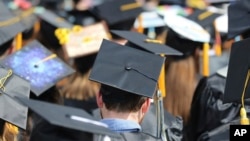
Nearly half of master's degrees have a negative financial return, according to new research by the Foundation for Research on Equal Opportunity, an economic research organization.
The study indicates that many graduate degree programs do not increase lifetime earnings enough to be worth it.
While 23% of bachelor’s degree programs yield a negative financial return on investment, 43% of two-year degrees and master’s degrees fail to deliver a return, according to the study by Preston Cooper, a senior fellow at FREOPP.
Cooper assessed the return on investment for 53,000 degree and certificate programs to determine whether a student’s lifetime earnings outweigh program costs and the risk of not completing their degree.
His findings show that a student’s field of study was the overriding indicator of return on investment at the undergraduate and graduate level.
Engineering, computer science and nursing bachelor’s degrees have high financial returns on investment, while programs in education, fine arts, psychology and English usually have low returns.
Graduate degrees in medicine and law tend to have strong payoffs. But a large share of master’s programs, including the MBA, frequently have low payoffs, according to Cooper.
Although workers with master’s degrees earn 16% more than those with only bachelor’s degrees, Cooper says the figure fails to account for students who had “higher preexisting earnings potential.”
“MBA students typically have high preexisting earnings potential, having often chosen high-ROI undergraduate majors such as finance and economics,” Cooper writes. “So the MBA adds little value on top of that.”
The study indicates that high starting salaries are predictors of high returns on investment. Degrees with starting salaries of $57,000 a year or more deliver the best lifetime returns.
But the return on investment of a degree can vary depending on the educational institution.
“Students interested in fields with low average pay can still find some schools that do well transforming those fields of study into high-paying careers,” Cooper writes.
The quality of an institution also matters, said William Tierney, professor emeritus of higher education at the University of Southern California.
“An MBA from Harvard is a likely ticket to a good job,” Tierney told VOA. “An MBA from the University of Phoenix, less so.”
But students pursue graduate programs for more than just financial reasons.
“Some degrees open up careers in fields that students may enjoy, such as in the performing arts,” Robert Kelchen, head of educational leadership at the University of Tennessee, Knoxville, told VOA.
“Others can help gain access to social networks or simply help students learn about a topic that is of interest,” Kelchen added.
Cooper told VOA that it might make sense for students in degree programs with low returns on investment to switch majors if they can still graduate on time.
He found the worst outcome for a student’s return on investment is dropping out of college “because they must pay for one or more years’ tuition and spend time out of the labor force.”
Lawmakers who fund higher education have a responsibility in ensuring “higher education delivers on its promise of economic mobility,” Cooper said.
Nearly a third of federal funding, including Pell grants and student loans, pays for higher education programs that fail to provide students with a return on investment, according to the study.
Cooper’s view is that “some schools should shut down low-ROI programs and reallocate institutional resources to programs with a better return.”
“There's definitely this narrative out there that higher education is always worth it, and you should always try to get that extra degree because it will increase your earnings,” he told VOA. “That's reinforced by colleges who make lofty promises regarding their graduate degree programs' outcomes, which all too often fall short.”
Harvard students end protest as school agrees to discuss Gaza conflict
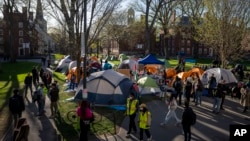
Protesters against the war between Israel and Hamas were voluntarily taking down their tents in Harvard Yard on Tuesday after university officials agreed to discuss their questions about the endowment, bringing a peaceful end to the kinds of demonstrations that were broken up by police on other campuses.
The student protest group Harvard Out of Occupied Palestine said in a statement that the encampment "outlasted its utility with respect to our demands." Meanwhile, Harvard University interim President Alan Garber agreed to pursue a meeting between protesters and university officials regarding the students' questions.
Students at many college campuses this spring set up similar encampments, calling for their schools to cut ties with Israel and businesses that support it.
The Israel-Hamas war began when Hamas and other militants stormed into southern Israel on October 7, killing some 1,200 people and taking 250 hostages. Palestinian militants still hold about 100 captives, and Israel's military has killed more than 35,000 people in Gaza, according to Gaza's Health Ministry, which doesn't distinguish between civilians and combatants.
Harvard said its president and the dean of the Faculty of Arts and Sciences, Hopi Hoekstra, will meet with the protesters to discuss the conflict in the Middle East.
The protesters said they worked out an agreement to meet with university officials, including the Harvard Management Company, which oversees the world's largest academic endowment, valued at about $50 billion.
The protesters' statement said the students will set an agenda that includes discussions on disclosure, divestment, reinvestment and the creation of a Center for Palestine Studies. The students also said that Harvard has offered to retract suspensions of more than 20 students and student workers and back down on disciplinary measures faced by 60 more.
"Since its establishment three weeks ago, the encampment has both broadened and deepened Palestine solidarity organizing on campus," a spokesperson for the protesters said. "It has moved the needle on disclosure and divestment at Harvard."
Chinese students report interrogations, deportations at US airports

Academics from China are reporting increased scrutiny at U.S. airports, with valid visa holders being interrogated and turned away by Customs and Border Protection Agents.
Phones and laptops have been searched, and researchers have undergone extensive questioning about their work. One graduate student at Yale, who was midway through her PhD, was turned back at Dulles airport and banned from entering the U.S. for five years, according to The Guardian.





